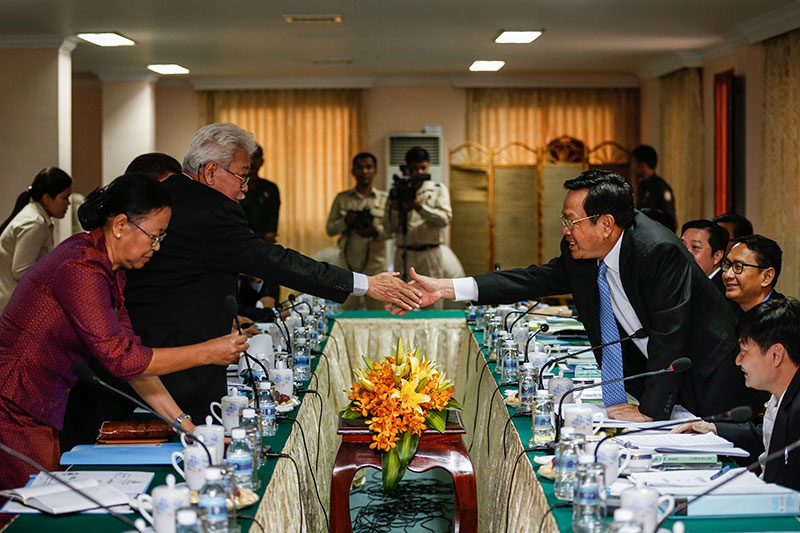The controversial draft union law will head to the National Assembly’s permanent committee today to be scheduled for an imminent vote, apparently incorporating none of the major changes requested by unions or employers during a public workshop on Monday, lawmakers said Thursday.
Members of the Assembly’s legislation commission met with officials from the Labor Ministry Thursday morning to agree on last-minute changes to the law, having hosted a workshop the day before for a final round of feedback from employer and employee groups, both of which have major concerns with the draft.

After 1-1/2 hours behind closed doors Thursday, CPP lawmaker and commission head Pen Panha told reporters that the permanent committee would decide today on a date to put the bill to a vote but declined to discuss the changes the group had just made.
Labor Minister Ith Sam Heng also declined to go into detail about what changes were made, other than to enumerate some minor fixes.
He said the lawmakers lowered the number of unions needed to form a federation and the number of federations needed to form a confederation, and agreed to extend the number of days unions would be given to provide their bank details to the ministry from 30 to 45. He said they also incorporated changes agreed to in January by a committee of CPP and CNRP lawmakers formed specifically to debate the draft law.
The minister did say that the proposed threshold for a union to call a legal strike was not among the changes. As it stands, the draft states that a strike cannot be held unless more than 50 percent of unionists at a specially-called meeting agree to it. The meeting itself must be attended by more than half of the union’s members at a given factory.
“There is no change,” Mr. Sam Heng said. “This is a condition to have democratic unions. If there is no target, the management of a union would not be representing the employees. So, before deciding to do something, they have to meet with their members to make a decision. So 50 plus one is suitable for making a decision to do something, instead of one or two leaders making a decision and causing problems for their members.”
Strikes have become a regular fixture of Cambodia’s heavily unionized garment sector. Some of the larger unions have been urging the government to lower the proposed strike threshold or do away with it entirely, claiming it would be too difficult to gather support from several thousand members at a single meeting.
Some unions made the request again during Monday’s workshop and also asked for changes to proposed penalties, financial reporting requirements, age limits for union leadership and a provision that would give the courts the power to suspend a union over the infractions of a single leader. The Garment Manufacturers Association in Cambodia, which represents the country’s approximately 500 exporting garment factories, is also seeking major changes to the law.
However, CNRP lawmaker Ke Sovannroth, who attended Thursday’s closed-door meeting, said none of those requests had been incorporated.
“The commission did not consider or discuss the opinions from Thursday’s workshop to put them into the law,” she said. “We regret it.”
Ms. Sovannroth said it was too soon to say whether she or other opposition lawmakers would vote against the bill or boycott the vote.
Although a majority of lawmakers can change a draft law on the floor of the Assembly, this happens only rarely, and the opposition lacks the votes to block or alter a bill.



